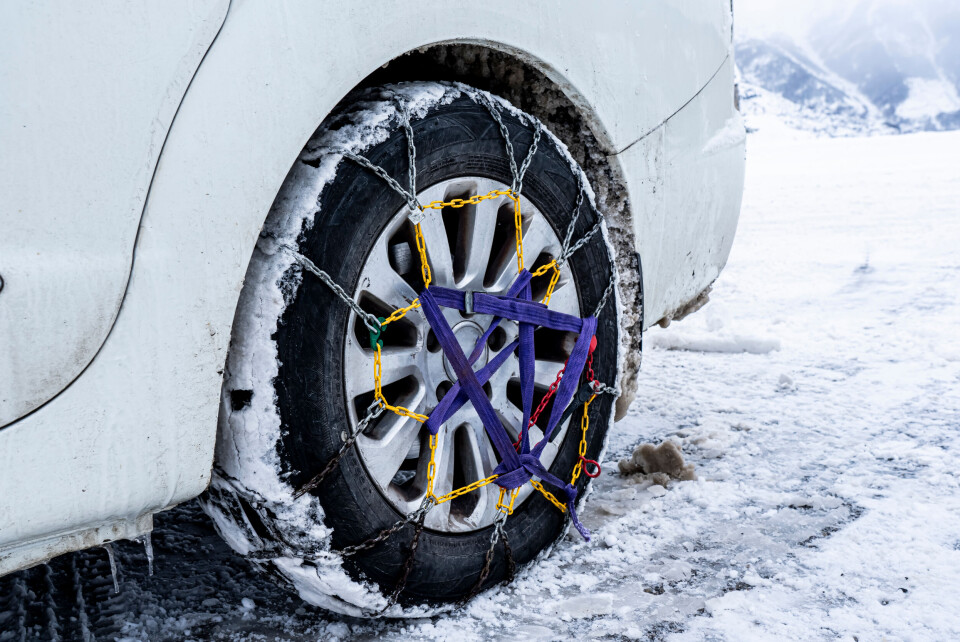-
Far-right MP suggests reopening of legal brothels in France
‘The current system is the height of bourgeois hypocrisy’, he has claimed
-
French couple must change windows after complaint over transparency
Replacement windows were the same size but glass used was transparent not translucent
-
Photos: snow returns to French Alps in July
Temperatures have dropped 5 - 10°C below seasonal norms in the east of the country
Snow tyre law could be used by French car insurers to refuse claims
Although drivers will not be fined for non-compliance until next year, insurers say they may be exempt from cover in the case of an accident

A new law requiring snow tyres or chains for vehicles in mountainous areas is not yet being enforced by fines – but drivers might not be covered by insurance in the event of accidents if they do not comply.
Comparable to drink-driving accidents
Insurance comparison site Lesfurets said: “The obligation to have snow tyres or chains is now law and can be used by insurance firms to refuse to pay out.
“For insurers, the requirement to drive vehicles fitted with the obligatory equipment applies.”
Insurer Leocare gave the same response, comparing this to drink-driving accidents, where insurers are also exempt from paying out.
Read more: Winter tyres, 90km/h: Five November updates for drivers in France
70% of people surveyed say chains are too costly
Tyre-sellers report that demand for winter tyres has not risen, despite the new rule.
Surveys show 65% of French people polled have not heard of the new law and 86% consider snow tyres to be too expensive.
Even snow chains are thought to be too costly and difficult to fit by 70% of people surveyed.
A pair of good quality snow chains costs around €65 and cheaper ones around €30. The size has to match the tyres and they are fitted to the driving wheels, usually the front ones.
They weigh around 4kg so it is recommended they are taken out of the car when not needed.
Snow tyres usually cost around €10 more than normal tyres, eg. €150 each compared to €140 for Michelins for a C5 Citroën.
They have different tread patterns and the rubber does not get less flexible below 7C, unlike normal tyres.
Read more: Should French car hire firms provide winter tyres or chains?
Cars fitted with them can drive faster than with chains but they wear out quicker than normal tyres in temperatures above 15C and so are changed in March in most parts of France.
Many drivers choose to have four new wheel rims as well so the tyres do not have to be removed every time the seasons change, nor the wheels re-balanced.
New law applies to parts of 48 departments
All-season tyres, also allowed under the new law, do not have to be changed after winter, but they usually wear out quicker and make more noise than normal tyres. They are slightly more expensive than winter tyres.
Read more: Are all-season tyres allowed during winter in France?
Snow tyres should be stored in a cool dark place over summer. Some tyre companies offer to rent storage space.
The new law applies to parts of 48 departments and came into effect last year.
This was due to be the first winter that €135 fines were levied for non-compliance, but the Ministry of Transport has extended the grace period until at least the end of the year.
Police can still pull people over and issue warnings to drivers who do not have appropriate tyres or snow chains in the vehicle. Snow chains only need to be fitted when there is slippery snow or ice on the road.
Usually signs are put up when conditions require chains to be fitted, but not always, and fitting them is the driver’s responsibility.
In some departments it is obligatory to have the equipment for all roads. Others are only applying the law to certain communes, usually above 1,000m.
Signposts should show areas where the law applies. You can also consult our online map.
Related articles
French-built Land Rover stand-in finally rolls off the production line
Can you leave your car parked on the street in France?
French garage did not fix my car’s fault: can I get a refund?
























